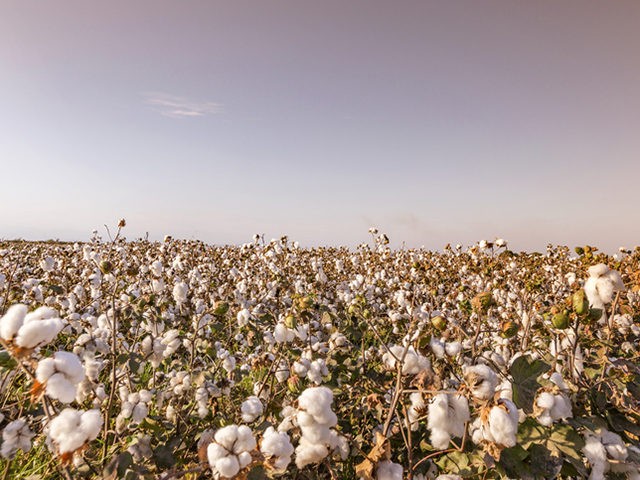Nearly 200 global human rights and labor groups launched a campaign Thursday demanding companies stop profiting from China’s enslaved ethnic minorities, noting that “virtually the entire apparel industry is tainted by forced Uyghur and Turkic Muslim labour.”
The group, calling itself the Coalition to End Forced Labour in the Uyghur Region, pointed out that over 80 percent of the cotton used to make clothing and other fabrics in China was picked in Xinjiang, making it extremely likely to have been picked by Uyghur slaves.
An estimated 84 percent of cotton in China grows in its western Xinjiang Uyghur Autonomous Region — about 20 percent of the cotton in the world, the Coalition noted on its site.
“Almost every major apparel brand and retailer selling cotton products is potentially implicated,” the Coalition asserted. “Right now, there is near certainty that any brand sourcing apparel, textiles, yarn or cotton from the Uyghur Region is profiting from human rights violations, including forced labour, both in the Uyghur Region and more broadly throughout China.”
“Brands continue to source millions of tons of cotton and yarn from the Uyghur Region. Roughly 1 in 5 cotton garments sold globally contains [sic] cotton and/or yarn from the Uyghur Region; it is virtually certain that many of these goods are tainted with forced labour,” the Coalition said in a statement debuting its campaign. “Moreover, apparel brands maintain lucrative partnerships with Chinese corporations implicated in forced labour, including those that benefit from the forced labour transfer of victims from the Uyghur Region to work in factories across China.”
The group is demanding that every company with ties to China “exit the Uyghur Region at every level of their supply chain, from cotton to finished products, to prevent the use of forced labour of Uyghurs and other groups in other facilities, and to end relationships with suppliers supporting the forced labour system.” They are demanding companies reach this goal in 12 months.
Exiting the Uyghur slave trade means not just ending operations in Xinjiang, but cutting ties to any Chinese company or facility that itself has ties to Xinjiang, even if the facilities the companies use are not there. It adds that companies have “no credible explanation” for how they can do business in China without profiting from slavery.
Among the organizations joining the Coalition are dozens of Uyghur advocacy groups around the world. Joining them, however, are a wide variety of organizations like Tibetan and Hong Kong solidarity groups and human rights NGOs like Human Rights Watch. Unions like the AFL-CIO and the H&M Hong Kong Staff Union have also signed on, as well as Christian charities like Christian Solidarity Worldwide.
“Global brands need to ask themselves how comfortable they are contributing to a genocidal policy against the Uyghur people,” Omer Kanat, the executive director of the Uyghur Human Rights Project, said in a statement marking the launch of the campaign. “These companies have somehow managed to avoid scrutiny for complicity in that very policy — this stops today.”
Western governments and human rights groups estimate that China is operating over 1,000 concentration camps in Xinjiang, its westernmost province and home to the majority of the country’s Muslim population. The camps, which the Chinese Communist Party has dubbed “vocational” or “training centers,” indoctrinate prisoners into worshipping dictator Xi Jinping, force them to renounce Islam and the Uyghur language, and enslave them, according to survivors. Survivors also note they experienced torture, rape, forced sterilization, abortion, and other atrocities.
The camps, according to witnesses, are outfitted with factories that the Chinese government excuses as “training centers” to teach unskilled Uyghurs how to work in factories, helping them out of poverty. Many of the estimated 1 to 3 million prisoners in the camps are doctors and other professionals with advanced degrees, however, calling into the question the need to train them in manual labor.
Studies have implicated dozens of the word’s top brands in Xinjiang’s slave labor racket. In March, the Australian Strategic Policy Institute (ASPI), a think tank, published its landmark report “Uyghurs for Sale,” identifying 83 global companies profiting from Uyghur slave labor. Notably, the report found evidence of Uyghur slavery not just in Xinjiang, but nationwide — in factories commissioned by these companies to manufacture their products hundreds of miles from the Uyghur homeland. ASPI revealed that the Communist Party offered financial incentives to manufacturers to buy Uyghurs slaves with online ads, thus shipping them to companies that have no overt ties to Xinjiang.
Among those listed by the ASPI report as benefiting from Uyghur slavery were Nike, BMW, Apple, Sony, Google, Lacoste, Adidas, and Nintendo. The World Uyghur Congress praised Adidas for taking steps to divorce itself from Xinjiang in June. A spokesman for Adidas told Breitbart News, “The Adidas workplace standards strictly prohibit all forms of forced and prison labor and are applicable to all companies across our supply chain. Adidas has never sourced goods from Xinjiang. Moreover, after the allegations were made in spring 2019, we immediately and explicitly instructed our suppliers not to source any yarn from the Xinjiang region.”
Answering similar inquiries from Reuters this week, Gap, Patagonia, and Inditex — which owns the company Zara — insisted they did not source goods from Xinjiang.
In the aftermath of the revelations in “Uyghurs for Sale,” however, not being active in Xinjiang does not necessarily guarantee the absence of slave labor in a company’s supply chain.

COMMENTS
Please let us know if you're having issues with commenting.